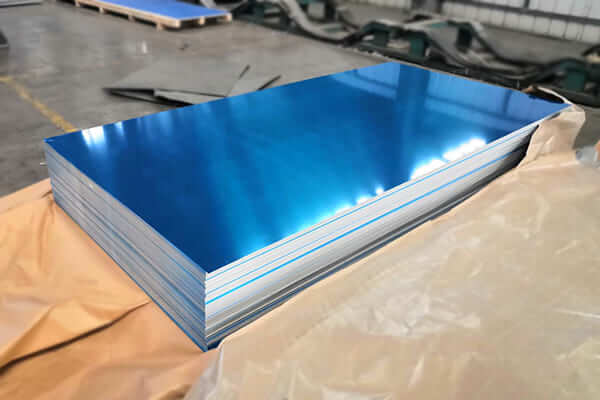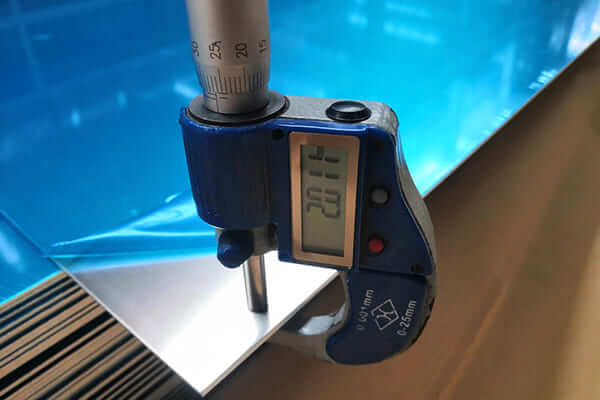Definition of aluminum sheet plate
Aluminum plate refers to a plate material made of aluminum or aluminum alloy, also named aluminum sheet which is usually made by heating, rolling and straightening aluminum ingots or solid solution aging heat.
Aluminum plates can be classified according to alloy composition and thickness.
According to alloy composition, aluminum plates can be divided into pure aluminum plates and alloy aluminum plates; according to thickness, aluminum plates can be divided into thin plates, conventional plates, medium plates, thick plates and ultra-thick plates.
Because aluminum alloy plates have strong corrosion resistance and high strength-to-weight ratio, they have a wide range of applications, such as transportation industry, construction industry, aerospace industry, mechanical processing industry, electronics industry, food and drug packaging industry, etc.
Range of customization of Langhe aluminum plates
Alloy grades
Langhe Aluminum focuses on the production and research and development of aluminum alloy materials.

We actively develop new alloy grades, break through technical barriers, and contribute to the development of the industry.
The alloys we can provide are:
1000 series: 1050, 1060, 1070, 1100, 1235, 1350, etc.;
2000 series: 2024, 2219, 2A12;
3000 series: 3003, 3004, 3104, 3105, 3A21, etc.;
5000 series: 5005, 5052, 5083, 5086, 5182, 5454, 5754, 5A06, etc.;
6000 series: 6005, 6016, 6061, 6063, 6082, etc.;
7000 series: 7005, 7075, etc.;
Thickness range
The thickness range of aluminum alloy sheets is usually divided into the following categories according to different uses and standards:
Thin Aluminum Sheet: Thickness 0.2mm ~ 6mm
Medium Thick Aluminum Plate: Thickness 6mm ~ 25mm
Thick Aluminum Plate: Thickness 25mm ~ 200mm
Extra Thick Aluminum Sheet Plate: Thickness > 200mm
Aluminum alloy sheets of different thicknesses have different properties.
The following are common thicknesses and applications:
| Thickness Range | Category | Common Applications |
|---|---|---|
| <0.2mm | Aluminum Foil | Food packaging, electronic heat dissipation films, cable shielding, pharmaceutical packaging, lithium battery foil |
| 0.2mm – 1mm | Ultra-Thin Sheet | Automotive trim, nameplates, metal packaging materials, electronic device casings |
| 1mm – 3mm | Thin Sheet | Building curtain walls, doors and windows, home appliance casings, automotive body panels, aerospace skin |
| 3mm – 6mm | Medium Sheet | Traffic signs, ship structures, pressure vessels, automotive chassis |
| 6mm – 25mm | Thick Sheet | Mechanical parts, mold manufacturing, bridge structures, ship decks, rail transit |
| 25mm – 200mm | Extra-Thick Sheet | Aerospace components, military equipment, precision molds, large-scale machining |
| >200mm | Ultra-Thick Sheet | Ship keels, high-strength aerospace structures, heavy machinery manufacturing |
Different alloy series (such as 1xxx, 3xxx, 5xxx, 6xxx, 7xxx) have unique performance characteristics within their applicable thickness ranges.
If you have a specific industry or application in mind, I can help you select the most suitable aluminum alloy type.
Aluminum Sheet Plate Width Range
The width of aluminum alloy sheets varies based on production processes and application requirements.
Below are common width ranges:
Standard Width Ranges
| Category | Common Width Range | Application Fields |
|---|---|---|
| Narrow-Width Sheets | 100mm ~ 1000mm | Electronic device casings, decorative strips, nameplates, packaging materials |
| Standard-Width Sheets | 1000mm ~ 1500mm | Building curtain walls, automotive body panels, home appliance panels |
| Medium-Width Sheets | 1500mm ~ 2000mm | Mechanical manufacturing, rail transit, aerospace skins |
| Extra-Wide Sheets | 2000mm ~ 2650mm | Shipbuilding, aerospace, large equipment structures |
Special Widths
- Some specialized aluminum alloy sheets can reach 4000mm or wider, particularly for large machinery, military, or shipbuilding applications. Such as, 2219-T37.
- Aluminum coils (rolled sheets) typically range from 800mm to 2000mm, but they can be slit into custom widths as needed.
Different aluminum alloy series (such as 1xxx, 5xxx, 6xxx, 7xxx) are suitable for various width ranges.
If you have specific industry or application needs, I can help you choose the right specifications.
























